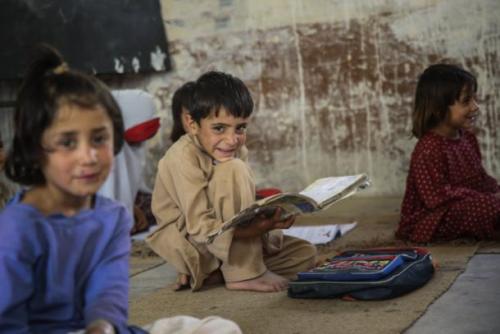
https://www.unesco.org/en/articles/out-school-children-and-educational-g...
10,000 billion dollars a year – the global cost of school drop-out and lack of education is staggering. In addition to these financial considerations, there is a considerable social impact. The message in this UNESCO report is clear: education is a strategic investment - one of the best investments for individuals, economies and society as a whole. I call our member states to ensure that this universal right becomes a reality for every human being as soon as possible.
In 1948, education was declared a "universal human right". This right was reaffirmed in 2015, when the United Nations defined access to quality education for all as a Sustainable Development Goal. Yet, despite decades of progress in access to education, 250 million children and young people worldwide are still out of school, and 70% of 10-year-olds in low- and middle-income countries are today unable to understand a simple written text.
In a new report published on Monday, entitled "The price of inaction: The global private, fiscal and social costs of children and youth not learning" [1], UNESCO puts the cost to the global economy of school drop-out and education gaps at $10,000 billion a year by 2030, equivalent to more than the annual GDPs of France and Japan combined.
Conversely, the report estimates that reducing the proportion of early school leavers or those without basic skills by just 10% would increase annual GDP growth by 1 to 2 percentage points. Education therefore appears to be one of the best investments a country can make.
Beyond these financial considerations, the report warns of the significant social damage caused by these educational shortcomings. Gaps in the acquisition of basic skills are associated, worldwide, with a 69% increase in early pregnancies among young girls, while each year of secondary education contributes to reducing the risk of girls marrying and having a child before the age of 18.
10 recommendations for quality education for all
During a gathering of education ministers on Monday at UNESCO headquarters in Paris (France) – in the presence of Gabriel Boric, President of Chile, who co-chairs with the Director-General the High-Level Steering Committee for Quality Education for All – Audrey Azoulay called on the Organization's 194 member states to "respect their commitment to transform education from a privilege to a prerogative for every human being throughout the world". The Director-General also recalled that "education is an essential resource for meeting the challenges of today, from poverty reduction to the fight against climate change".
To achieve the goal of quality education for all, the UNESCO report provides 10 recommendations. The first of these is that governments should guarantee free, publicly-funded schooling for every girl and boy for a minimum of twelve years. Such schooling must go hand in hand with investment in early childhood, to lay the foundations for learning as early as possible and combat inequality. “Second-chance" programs must also be set up for young people who have not been able to benefit from a quality education, or whose education has been interrupted.
The learning environment must also be both safe and inclusive. UNESCO calls for short distances between children's homes and their schools, especially in disadvantaged areas, and for all schools to have access to water and sanitation. Class sizes must be kept small, and lessons taught by qualified, motivated teachers who support all pupils in an equitable manner, paying particular attention to gender equality.
UNESCO also encourages States to sensitize local communities and families to the importance of girls and boys completing a full cycle of education, and to involve parents in school activities and management.
[1] Published in partnership with the OECD and the Commonwealth Secretariat
About UNESCO
With 194 Member States, the United Nations Educational, Scientific and Cultural Organization contributes to peace and security by leading multilateral cooperation on education, science, culture, communication and information. Headquartered in Paris, UNESCO has offices in 54 countries and employs over 2300 people. UNESCO oversees more than 2000 World Heritage sites, Biosphere Reserves and Global Geoparks; networks of Creative, Learning, Inclusive and Sustainable Cities; and over 13 000 associated schools, university chairs, training and research institutions. Its Director-General is Audrey Azoulay.
“Since wars begin in the minds of men, it is i










